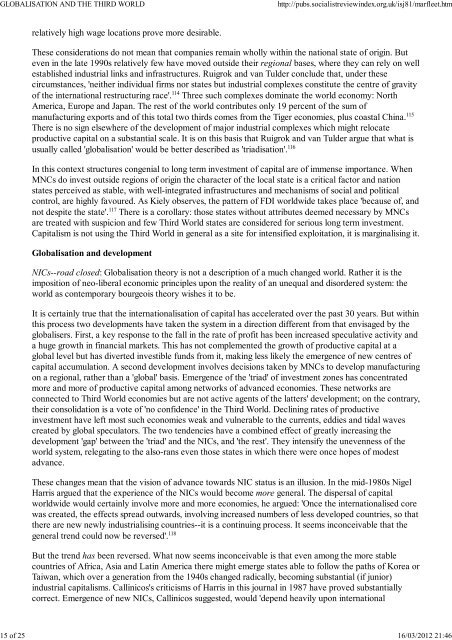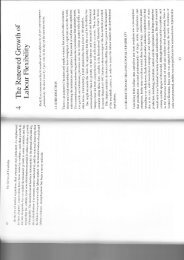GLOBALISATION AND THE THIRD WORLD.pdf - Steerweb.org
GLOBALISATION AND THE THIRD WORLD.pdf - Steerweb.org
GLOBALISATION AND THE THIRD WORLD.pdf - Steerweb.org
You also want an ePaper? Increase the reach of your titles
YUMPU automatically turns print PDFs into web optimized ePapers that Google loves.
<strong>GLOBALISATION</strong> <strong>AND</strong> <strong>THE</strong> <strong>THIRD</strong> <strong>WORLD</strong>http://pubs.socialistreviewindex.<strong>org</strong>.uk/isj81/marfleet.htm15 of 25 16/03/2012 21:46relatively high wage locations prove more desirable.These considerations do not mean that companies remain wholly within the national state of origin. Buteven in the late 1990s relatively few have moved outside their regional bases, where they can rely on wellestablished industrial links and infrastructures. Ruigrok and van Tulder conclude that, under thesecircumstances, 'neither individual firms nor states but industrial complexes constitute the centre of gravityof the international restructuring race'. 114 Three such complexes dominate the world economy: NorthAmerica, Europe and Japan. The rest of the world contributes only 19 percent of the sum ofmanufacturing exports and of this total two thirds comes from the Tiger economies, plus coastal China. 115There is no sign elsewhere of the development of major industrial complexes which might relocateproductive capital on a substantial scale. It is on this basis that Ruigrok and van Tulder argue that what isusually called 'globalisation' would be better described as 'triadisation'. 116In this context structures congenial to long term investment of capital are of immense importance. WhenMNCs do invest outside regions of origin the character of the local state is a critical factor and nationstates perceived as stable, with well-integrated infrastructures and mechanisms of social and politicalcontrol, are highly favoured. As Kiely observes, the pattern of FDI worldwide takes place 'because of, andnot despite the state'. 117 There is a corollary: those states without attributes deemed necessary by MNCsare treated with suspicion and few Third World states are considered for serious long term investment.Capitalism is not using the Third World in general as a site for intensified exploitation, it is marginalising it.Globalisation and developmentNICs--road closed: Globalisation theory is not a description of a much changed world. Rather it is theimposition of neo-liberal economic principles upon the reality of an unequal and disordered system: theworld as contemporary bourgeois theory wishes it to be.It is certainly true that the internationalisation of capital has accelerated over the past 30 years. But withinthis process two developments have taken the system in a direction different from that envisaged by theglobalisers. First, a key response to the fall in the rate of profit has been increased speculative activity anda huge growth in financial markets. This has not complemented the growth of productive capital at aglobal level but has diverted investible funds from it, making less likely the emergence of new centres ofcapital accumulation. A second development involves decisions taken by MNCs to develop manufacturingon a regional, rather than a 'global' basis. Emergence of the 'triad' of investment zones has concentratedmore and more of productive capital among networks of advanced economies. These networks areconnected to Third World economies but are not active agents of the latters' development; on the contrary,their consolidation is a vote of 'no confidence' in the Third World. Declining rates of productiveinvestment have left most such economies weak and vulnerable to the currents, eddies and tidal wavescreated by global speculators. The two tendencies have a combined effect of greatly increasing thedevelopment 'gap' between the 'triad' and the NICs, and 'the rest'. They intensify the unevenness of theworld system, relegating to the also-rans even those states in which there were once hopes of modestadvance.These changes mean that the vision of advance towards NIC status is an illusion. In the mid-1980s NigelHarris argued that the experience of the NICs would become more general. The dispersal of capitalworldwide would certainly involve more and more economies, he argued: 'Once the internationalised corewas created, the effects spread outwards, involving increased numbers of less developed countries, so thatthere are new newly industrialising countries--it is a continuing process. It seems inconceivable that thegeneral trend could now be reversed'. 118But the trend has been reversed. What now seems inconceivable is that even among the more stablecountries of Africa, Asia and Latin America there might emerge states able to follow the paths of Korea orTaiwan, which over a generation from the 1940s changed radically, becoming substantial (if junior)industrial capitalisms. Callinicos's criticisms of Harris in this journal in 1987 have proved substantiallycorrect. Emergence of new NICs, Callinicos suggested, would 'depend heavily upon international




